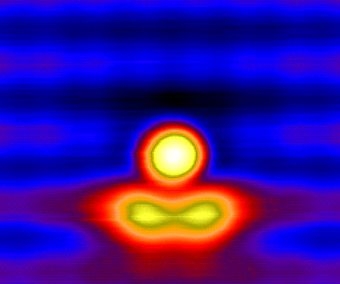Dwayne: With the advent of quantum physics, physicists have largely given up on the attempt to present physical theories which can be connected to observable reality.
Indeed, when it comes to the things they talk about, like atoms and electrons and photons and stuff, they do not believe that reality is not knowable.
In fact, a lot of physicists will tell you that the microscopic world, the atomic world is not knowable. And maybe the rest of the world is also not knowable. They talk about electrons not really having definite properties. They say that a photon, that light, is both a wave and a particle. And other nonsense.
This is just a projection of anti-realist epistemology, of their philosophy. As if reality is fundamentally unknowable. But that is not true. You can’t justify that, even though they will try to use quantum mechanics to justify the philosophy they’ve already assumed.
Narendra: Exactly.
Dwayne: They will say, oh, that physics is fundamental and not philosophy and that philosophy just has to give way to physics. But that is not how it works.
But Bohr and the like, they were a bit more honest. They kind of admitted that philosophy was the motivation. But physicists of today do not want to admit this.
So instead of dealing with reality, which they do not believe that you can know anyway, they came up with a lot of mathematics. And they stopped there. That shut up and calculate thing. The mathematics is all they offered. You have to be able to somehow understand it without being able to tie it to tangible, understandable physical reality. Take string theory, it is all about little strings on a quantum scale.
Narendra: Little strings and they pull the strings.

Dwayne: Ha! What are the strings? What? Are there any physical, real things? What do they represent? No, I don’t know. It’s just a bunch of really complicated math. What does it mean? Who knows? Does it describe observable physical objects?
Not that I can tell. Not that anyone can tell. They say: well, it is our best guess. Take our word for it, it works! It works, even though they can’t make any predictions!
Narendra: Yeah, it works? How does it work? Hahaha!
Dwayne: They cannot even make any predictions. So, what use of it? Not that science is all about making predictions. It is about understanding the world. But they think if they can predict things, then that is just as good. But that’s not what science is about.
Anyway, none of this gets us closer to understanding how the physical world actually works. And it just makes people think that physics is not about the world. As if it describes some Platonic mathematical universe. Who wants to do that? No sane person, I think.
Narendra: What you are saying, Dwayne, is that it need not be this difficult?
Dwayne: It should not be this difficult, no. It should not be this difficult. If we have understandable mathematics, then we can take the mathematics and figure out what it is talking about
If we could look at real objects, if we could understand what it is what the mathematics was really telling us, we might be able to understand any of it. It wouldn’t just be a bunch of equations, a bunch of math, which is basically all string theory is.
Instead, they just memorize a bunch of meaningless mathematical equations that we cannot tie back to reality.
But let’s suppose that we fixed all of this. Let’s suppose we tied physics back to reality. Made all of this rational again. Is all of this going to become easy? Is all of this going to be something you can master in high school? I don’t think so. I just do not think it will ever be an easy subject, at least not for everyone.
Narendra: Even if you make it all connected to reality, it takes a little longer time to get the facts together.
Dwayne: Yeah, there’s a lot of complicated abstractions like energy. Even if we knew what energy is, it’s a very high-level concept, I suspect. Okay, energy is defined as the ability to do work. But what does that mean? We don’t know. But, but even that’s kind of a high-level abstraction.
And there were things like atoms and if we had a rational quantum theory it is still a quite long involved chain of knowledge required to really understand how this works.

Narendra: The chain is long, even if you connect it to reality, the chain has to be gone through, step by step.
Dwayne: Yeah, it is a very complicated subject.
Narendra: And the physics is very abstract, yes.
Dwayne: And there is still the complicated math. I do not think that all of the complicated math is just going to go away. We might be able to understand it, but you still have to learn a lot of complicated math.
Narendra: Basic math and then higher math and still higher math…
Dwayne: Calculus, group theory, all kinds of complicated math.
Narendra: Differential equations.
Dwayne: Differential equations, yeah. My wife majored in physics. She did, I don’t know like half a dozen different math papers or more.
Narendra: Half a dozen courses on mathematics so you can imagine how really complex physical reality be.
Dwayne: And I think she did two different papers on differential equations. And that is before we get to the really hard stuff, which string theory is made up of.
I think if we got rid of string theory, we could get rid of a lot of this crazy mess. But the main point is that even if we fixed physics, made it rational again, I think it would be a pretty complicated subject There is still a lot of math and a long… a long…
Narendra: Chain of reasoning, right?
Dwayne: I think yeah, I think it’s always going to be somewhat difficult for some people. And I think that makes sense.
Even if you look up say only 19th-century physics, say Maxwell’s equations. They take some differential equations and methods to really understand that. I don’t know about four different math courses to understand Maxwell’s equations properly. A couple of calculus papers, a couple of differential equations papers. Lots of math any way you put it.
End of the preview. Click here to read the entire transcript.

